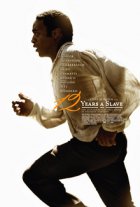
12 Years a Slave
CARD:
1841FADE IN:
1 INT. TOWNHOUSE/STUDY - DAY 1
-EARLY APRIL, 1841
We are close on a PAIR OF BLACK HANDS as they open AFINELY WRAPPED PACKET OF VIOLIN STRINGS.
WE CUT TO the hands stringing a VIOLIN. It's not a highend piece, but it is quite nice.
WE CUT TO a wide shot of the study. Sitting in a chairwith violin in hand is SOLOMON NORTHUP; a man in his latetwenties. Everything about Solomon, his mien and manner,
is distinguished. But he, too, seems a hardy individual.
Someone who has known manual labor in his time.
Solomon begins to lightly play his violin, as if testingthe strings, their tuning. Satisfied, Solomon begins toplay vigorously. As he does, we make a HARD CUT TO:
2 INT. HOUSE/LIVING ROOM - EVENING 2
We come in on a lively affair. A dinner party is beingthrown within the confines of a fairly stately house. In
attendance are EIGHT COUPLES. All are WHITE and all are
FAIRLY YOUNG, in their early twenties. The men and women
are dressed in very fine attire. We should get the sensethat for the most part they are people of means.
The furniture has been set aside in the living room. At
the moment the couples are engaged in the dancing of aREEL.
The music they are dancing to is being played by Solomon,
having cut directly from the tune he was previouslyplaying. He plays with a light determination, and in noway seems possessed with empty servitude.
Solomon concludes the reel, and the dancers break intoenthusiastic applause, which is followed by personalthanks and congratulations from all. It should be clear
that despite their respective races there is muchadmiration and appreciation for Solomon's abilities.
3 INT. NORTHUP HOUSE/BEDROOM - MORNING 3
It is a Saturday morning. Clad in her finest attire is
ANNE; Solomon's wife, a few years younger than he. We
see also the Northup children: MARGARET who is eight, andALONZO who is five. They are handsome, and well groomedkids. Anne straightens up the children. She finishes,
(CONTINUED)
1/24/13 FINAL SHOOTING SCRIPT 2.
3 CONTINUED:
3 3 CONTINUED: 3she rises up and stands behind them, almost as ifpreparing to pose for a portrait.
They all wait a moment, then Solomon enters the foyer.
He stands and looks admiringly at his family. ADMIRINGLY
stressed. It isn't that he doesn't have love for them,
he does as well. But in the moment, he truly admires hisgreatest accomplishment: a family that is healthy andwell and provided for. He goes to his children, andhands each a coin, then goes to Anne. Gives her a kiss
on the cheek. The children giggle at the sight.
4 EXT. STREET -DAY 4
Solomon and his family are out walking along the streetsand groves of Saratoga.
The streets are well populated this morning with manypeople out strolling. Most are WHITE, but there areBLACKS as well. They are FREED BLACKS who mingle fairlyeasily - though not always completely - with the whites.
We see, too, a few BLACK SLAVES who travel with theirWHITE MASTERS. These pairings are largely from the southand - despite the fact the blacks are slaves - they arenot physically downtrodden, not field hands. They arewell dressed and "leading apparently an easy life" -
comparatively speaking - as they trail their masters.
As they walk, Solomon and his family arrive to anintersection well-worn and muddied from horse and cart
traffic. Solomon and his children easily jump across themuck. Anne stands at the lip of the puddle, calls forSolomon to help her across.
ANNE:
Solomon...
Solomon, turning back to his wife with a broad smilewaving her forward:
SOLOMON:
Come, Anne. Jump.
The children, now smiling as well, egg their mother on.
ALONZO MARGARET:
Jump. You can make it. I've done it. You can make
it.
ANNE:
I will not ruin my dress. Catch
me!
Solomon moves close, holds out his arms. Yet, there'sstill just a bit of mischievousness in his eyes. Anne
gives her husband a lightly stern look to which Solomonreplies.
(CONTINUED)
1/24/13 FINAL SHOOTING SCRIPT 3.
4 CONTINUED:
4 4 CONTINUED: 4SOLOMON:
I will catch you, Anne.
(beat)
I will.
Again, lightly stern:
ANNE:
You will.
And with that Anne takes the leap. Solomon catches her,
swings her around grandly and sets her down lightly tothe delighted applause of the children. That done,
Solomon takes Anne's hand and leads her on.
As Solomon and his family make their way, among theslaves on the street, we see one in particular; JASPER.
As he trails his MASTER he can't help but note Solomonand his family as they enter A STORE. His intrigue ofthis most handsome and harmonious group should beobvious.
With his Master occupied, Jasper moves slyly toward theSTORE. Frozen on the spot, Jasper looks on admiringly.
Suddenly a voice barks out-
A VOICE (O.S.)
Jasper! Come on!
5 INT. STORE -LATER 5
We are inside the store of MR. CEPHAS PARKER; a white manand a supplier of general goods. Solomon greets himwith:
SOLOMON:
Mr. Parker.
PARKER:
Mr. Northup. Mrs. Northup.
With money in hand the Northup children move quicklyabout the store looking for items to purchase.
(CONTINUED)
1/24/13 FINAL SHOOTING SCRIPT 4.
5 CONTINUED:
5 5 CONTINUED: 5Anne looks over some silks and fabrics. Parker suggeststo Solomon:
PARKER (CONT’D)
A new cravat, Solomon? Pure silk
by way of the French.
SOLOMON:
We are in need of a fresh carryall for the Mrs's travels.
PARKER:
A year's passed? Off to SandyHill?
ANNE:
I am.
Using a long pole, Mr. Parker fetches down a CARRY ALLfrom an upper shelf.
PARKER:
Something to suit your style, butsturdy enough for the forty milesround trip.
Handing the Bag to Anne, she is immediately taken by it.
ANNE:
It's beautiful.
SOLOMON:
(cautiously)
At what price?
ANNE:
We will take it. Children, comesee what your father has justpurchased for me.
As the children run over - chattering excitedly about thenew gift - they RUN PAST JASPER who has quietly enteredthe store.
At the checkout counter sits a portrait of WILLIAM HENRYHARRISON, the edges draped in black crepe. Before the
book sits a LEDGER. Mr. Parker asks of Solomon:
PARKER:
If you would sign our condolencebook. My hope is to find a way toforward it to the Widow Harrison.
Sad days for the nation.
SOLOMON:
Yes, certainly. Poor Mrs. Harrisand her children. I hope brightertimes ahead.
(CONTINUED)
1/24/13 FINAL SHOOTING SCRIPT 4A.
5 CONTINUED:
(2) 5Jasper looks scared, timid. It's as though he'd like toengage, but is unsure of as to how. Noting Jasper, Parkersays:
PARKER:
A moment, sir, and you will beassisted.
SOLOMON:
If we could discuss the price...
(CONTINUED)
1/24/13 FINAL SHOOTING SCRIPT 5.
5 CONTINUED:
(3) 5 5 CONTINUED: (3) 5PARKER:
Forgive me, Mrs. Northup. A
customer waits. Welcome, sir.
To Jasper, with good nature:
SOLOMON:
Shop well, but mind your wallet.
PARKER:
Ignore the gentleman's nonsense.
Now, may I interest you in a new
Translation
Translate and read this script in other languages:
Select another language:
- - Select -
- 简体中文 (Chinese - Simplified)
- 繁體中文 (Chinese - Traditional)
- Español (Spanish)
- Esperanto (Esperanto)
- 日本語 (Japanese)
- Português (Portuguese)
- Deutsch (German)
- العربية (Arabic)
- Français (French)
- Русский (Russian)
- ಕನ್ನಡ (Kannada)
- 한국어 (Korean)
- עברית (Hebrew)
- Gaeilge (Irish)
- Українська (Ukrainian)
- اردو (Urdu)
- Magyar (Hungarian)
- मानक हिन्दी (Hindi)
- Indonesia (Indonesian)
- Italiano (Italian)
- தமிழ் (Tamil)
- Türkçe (Turkish)
- తెలుగు (Telugu)
- ภาษาไทย (Thai)
- Tiếng Việt (Vietnamese)
- Čeština (Czech)
- Polski (Polish)
- Bahasa Indonesia (Indonesian)
- Românește (Romanian)
- Nederlands (Dutch)
- Ελληνικά (Greek)
- Latinum (Latin)
- Svenska (Swedish)
- Dansk (Danish)
- Suomi (Finnish)
- فارسی (Persian)
- ייִדיש (Yiddish)
- հայերեն (Armenian)
- Norsk (Norwegian)
- English (English)
Citation
Use the citation below to add this screenplay to your bibliography:
Style:MLAChicagoAPA
"12 Years a Slave" Scripts.com. STANDS4 LLC, 2025. Web. 12 Mar. 2025. <https://www.scripts.com/script/12_years_a_slave_47>.







Discuss this script with the community:
Report Comment
We're doing our best to make sure our content is useful, accurate and safe.
If by any chance you spot an inappropriate comment while navigating through our website please use this form to let us know, and we'll take care of it shortly.
Attachment
You need to be logged in to favorite.
Log In